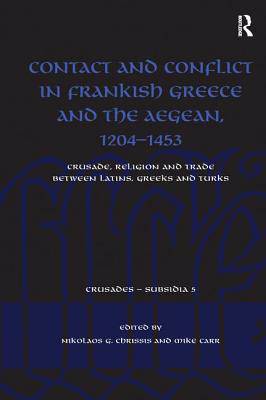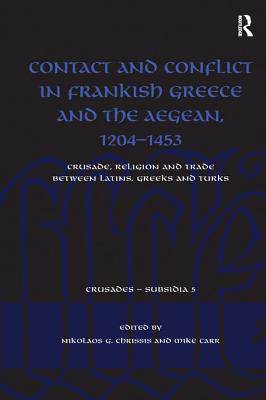
- Retrait gratuit dans votre magasin Club
- 7.000.000 titres dans notre catalogue
- Payer en toute sécurité
- Toujours un magasin près de chez vous
- Retrait gratuit dans votre magasin Club
- 7.000.0000 titres dans notre catalogue
- Payer en toute sécurité
- Toujours un magasin près de chez vous
Contact and Conflict in Frankish Greece and the Aegean, 1204-1453
Crusade, Religion and Rade Between Latins, Greeks and Turks
71,95 €
+ 143 points
Description
The conquest of Constantinople by the Fourth Crusade shattered irreversibly the political and cultural unity of the Byzantine world in the Greek peninsula, the Aegean and western Asia Minor. Between the disintegration of the Byzantine Empire after 1204 and the consolidation of Ottoman power in the fifteenth century, the area was a complex political, ethnic and religious mosaic, made up of Frankish lordships, Italian colonies, Turkish beyliks, as well as a number of states that professed to be the continuators of the Byzantine imperial tradition. This volume brings together western medievalists, Byzantinists and Ottomanists, combining recent research in the relevant fields in order to provide a holistic interpretation of this world of extreme fragmentation. Eight stimulating papers explore various factors that defined contact and conflict between Orthodox Greeks, Catholic Latins and Muslim Turks, highlighting common themes that run through this period and evaluating the changes that occurred over time. Particular emphasis is given on the crusades and the way they affected interaction in the area. Although the impact of the crusades on Byzantine history leading up to 1204 has been extensively examined in the past, there has been little research on the way crusading was implemented in Greece and the Aegean after that point. Far from being limited to crusading per se, however, the papers put it into its wider context and examine other aspects of contact, such as trade, interfaith relations, and geographical exploration.
Spécifications
Parties prenantes
- Editeur:
Contenu
- Nombre de pages :
- 252
- Langue:
- Anglais
- Collection :
Caractéristiques
- EAN:
- 9781138270367
- Date de parution :
- 17-10-16
- Format:
- Livre broché
- Format numérique:
- Trade paperback (VS)
- Dimensions :
- 156 mm x 233 mm
- Poids :
- 452 g

Les avis
Nous publions uniquement les avis qui respectent les conditions requises. Consultez nos conditions pour les avis.





